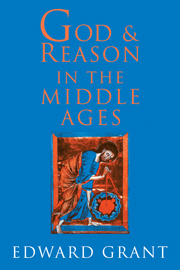Book contents
- Frontmatter
- Contents
- Acknowledgments
- Introduction
- 1 The Emergence of a Transformed Europe in the Twelfth Century
- 2 Reason Asserts Itself: The Challenge to Authority in the Early Middle Ages to 1200
- 3 Reason Takes Hold: Aristotle and the Mediveal University
- 4 Reason in Action: Logic in the Faculty of Arts
- 5 Reason in Action: Natural Philosophy in the Faculty of Arts
- 6 Reason in Action: Theology in the Faculty of Theology
- 7 The Assault on the Middle Ages
- Conclusion: The Culture and Spirit of “Poking Around”
- Bibliography
- Index
3 - Reason Takes Hold: Aristotle and the Mediveal University
Published online by Cambridge University Press: 28 August 2009
- Frontmatter
- Contents
- Acknowledgments
- Introduction
- 1 The Emergence of a Transformed Europe in the Twelfth Century
- 2 Reason Asserts Itself: The Challenge to Authority in the Early Middle Ages to 1200
- 3 Reason Takes Hold: Aristotle and the Mediveal University
- 4 Reason in Action: Logic in the Faculty of Arts
- 5 Reason in Action: Natural Philosophy in the Faculty of Arts
- 6 Reason in Action: Theology in the Faculty of Theology
- 7 The Assault on the Middle Ages
- Conclusion: The Culture and Spirit of “Poking Around”
- Bibliography
- Index
Summary
FOR MOST OF THE TWELFTH CENTURY, LEARNING IN WESTERN Europe was based on treatises that had originated within a Latin tradition that was comprised largely of handbooks, compendia, and encyclopedic works. Much of this knowledge had roots in Greek treatises written during the Hellenistic period. Some of this encyclopedic knowledge reached Latin authors, who either knew enough Greek to understand it or had access to translations.
THE LATIN TRADITION OF LEARNING IN THE EARLY MIDDLE AGES PRIOR TO THE INFLUX OF NEW TRANSLATIONS
Two Roman authors of the first century A.D. made significant contributions. Seneca (d. A.D. 68) titled his most famous treatise Natural Questions and filled it with information about geographical and meteorological phenomena into which he interjected morals drawn from nature, a feature that made his book popular with Christians. Pliny the Elder (A.D. 23/24–79), Seneca's contemporary, wrote a massive encyclopedic treatise in 37 books titled Natural History. Almost anything was grist for Pliny's insatiable information mill. These two treatises and the numerous extant handbooks in Greek and Latin formed a basis for subsequent authors who wrote for a Latin-speaking audience. As we saw in Chapter 1, between the fourth and eighth centuries, such authors as Macrobius, Chalcidius, Martianus Capella, Boethius, Cassiodorus, Isidore of Seville, and Venerable Bede provided the means for understanding the cosmic structure and operation of the world.
- Type
- Chapter
- Information
- God and Reason in the Middle Ages , pp. 83 - 114Publisher: Cambridge University PressPrint publication year: 2001



